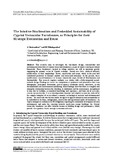| dc.description.abstract | This research aims to investigate the bioclimatic design, sustainability and
environmental behaviour of Cypriot vernacular farmhouses, as part of small-scale family-owned
farmsteads. These farmhouses, located in village outskirts, are still in operation, greatly
supporting the primary sector of Cypriot economy. Current uses have conduced arbitrary
modifications in their morphology, layout, construction and usage, which in the past had
contributed positively to thermal comfort and household autonomy. In the present, these
modifications caused farmhouses to become climatically inept, devoid of Bioclimatism and
Sustainability. This research employs multiple case studies with a fully-integrated mixedmethods
design. Findings are drawn via triangulation of qualitative and quantitative data from
ethnographic participant observation, post-occupancy evaluation survey, interviews, in-situ
documentation and environmental monitoring. Initial findings show that there is a tangible and
intangible relationship between the dwelling, its inhabitants and the environment, strengthened
in time due to tradition, accumulated knowledge and experience, and born out of necessity,
scarcity and practicality. It is an interdependent, dynamic and adaptive reciprocity, induced by
the complex interplay of socio-cultural, economic, technological, aesthetic and environmental
factors. The end result was for bioclimatic design to be applied intuitively and sustainability to
be embedded in the form, configuration, construction and operational modes of farmhouses. As
Cyprus attempts to conform to its EU obligations regarding the sustainable development of rural
environments and make the transition towards nearly-zero energy buildings, the Cypriot
vernacular farmhouse can offer valuable lessons in building design and performance, whilst
provide clear guidance for its strategic restoration and reuse. | en_UK |


